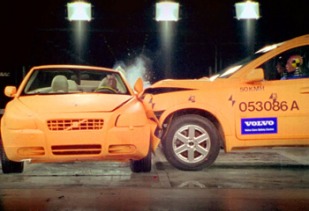I took possession of a new laptop at work the other day, the old one having come to the end of it’s usefulness after a series of blue-screen-of-death episodes (and, interestingly, one white-with-peach-stripes-screen-of-death episode, which led to our IT chappy having a nose bleed). Sitting down to have a play with my new toy I was struck by the fact that the specs on this teeny-tiny little thing (I believe the correct term is ‘netbook’?) are not only higher than those of the outgoing laptop, but also higher than those of the high’ish-end gaming desktop I bought just five years ago and have since employed as a temporary door stop in the garage. So it seems that technology has moved on so quickly that something I paid a couple of grand for 5 years ago is now beaten hands down by a $300 widget the size of a good book (you know, the hard cover kind that has a gun, a pool of blood and a rose on the front)?
This, plus a glass or two of cheap plonk, got me thinking about how far we’ve come, not just in the last five years, or even the last ten years, but over the last hundred or so years. Look at what we’ve achieved (I use the collective ‘we’, since I personally have achieved very little beyond annoying people and making my liver miserable) in the space of a couple of lifetimes. It’s a quite frankly staggering amount.
This, plus a glass or two of cheap plonk, got me thinking about how far we’ve come, not just in the last five years, or even the last ten years, but over the last hundred or so years. Look at what we’ve achieved (I use the collective ‘we’, since I personally have achieved very little beyond annoying people and making my liver miserable) in the space of a couple of lifetimes. It’s a quite frankly staggering amount.

This was actually years ahead of my first phone.
Let me use my grandfather to illustrate this point; he was born in 1896, just outside Saint David's (I’m part Welsh, there, I’ve said it). There was no running water, no electricity, and no sewage system in the village. And yet within his lifetime he would witness the automobile go from being rickety, unreliable and slow, to breaking 630mph at the hands of Richard Noble. Not only did the Wright Brothers make their first flight in his lifetime, but Concord and the SR-71 also made theirs. Man went from looking at the moon to standing on it, from buggering about with cavalry charges to buggering about with truly terrifying weapons of mutually assured destruction. And then just when we found ourselves pushing the envelope of what could be done in the real world, we got distracted by a virtual world. Heck, never mind Grampy, when I was at university in 1995, just 15 years ago, computers were huge and slow and the internet was pretty much used for downloading iffy porn and sending new-fangled electronic mail. My first mobile phone, also in 1995, was a Nokia which was about the size of a brick and which had about as much functionality.
By the time Grampy shuffled off this mortal coil in 1988 he had lived through one of the most astonishing periods in history, and it hasn’t stopped since then. Technological advances mean we have a better understanding of how to treat diseases, how to make things better, stronger, more efficient and longer lasting. We can create mutant crops that produce more food, clone animals, share information at the speed of light (might be exaggerating there) with people on the other side of the planet, watch what we want when we want, organize our entire lives from our mobile phones and buy a new suit/car/house/wife/child without ever lifting our arses off our sofas.
Obviously there have been hiccups along the way, as there is with any kind of progression. Take Ned Ludd, for example, and the movement which took his name; way back in the 1800s, just as the industrial revolution was really getting going, a group of millworkers and artisans started to take exception to these new fangled machines making a mockery of their skills and taking their jobs. The story goes that Ned, obviously a tad ticked off, wrecked a couple of looms somewhere up north, and in doing so sparked a rash of copy-cat wreckings that sparked a movement, and so the Luddites were born; a group of people who fundamentally rejected technological progression in the textile industry, and nowadays a term for anyone who rejects technology of any kind.
By the time Grampy shuffled off this mortal coil in 1988 he had lived through one of the most astonishing periods in history, and it hasn’t stopped since then. Technological advances mean we have a better understanding of how to treat diseases, how to make things better, stronger, more efficient and longer lasting. We can create mutant crops that produce more food, clone animals, share information at the speed of light (might be exaggerating there) with people on the other side of the planet, watch what we want when we want, organize our entire lives from our mobile phones and buy a new suit/car/house/wife/child without ever lifting our arses off our sofas.
Obviously there have been hiccups along the way, as there is with any kind of progression. Take Ned Ludd, for example, and the movement which took his name; way back in the 1800s, just as the industrial revolution was really getting going, a group of millworkers and artisans started to take exception to these new fangled machines making a mockery of their skills and taking their jobs. The story goes that Ned, obviously a tad ticked off, wrecked a couple of looms somewhere up north, and in doing so sparked a rash of copy-cat wreckings that sparked a movement, and so the Luddites were born; a group of people who fundamentally rejected technological progression in the textile industry, and nowadays a term for anyone who rejects technology of any kind.

Nice one guys, REALLY helpful...
Since then there have been other road bumps, wrong turns and even some real bloopers; think the Manhattan Project (“guys, let’s see if we can destroy the world”), biological engineering (“right then, let’s splice the flu virus together with some ebolas and see what happens”), the Reliant Robin (“four wheels are for wussies, three is t’way to go”) and Eastenders (“instead of using TV to educate people, let’s use it to slowly crush their spirit instead”).
Oh, and for those of you with something of a doomsday/conspiracy bent who’ve seen Terminator too many times, let me ask you this; you think you can turn the internet off? How, exactly?
Oh, and for those of you with something of a doomsday/conspiracy bent who’ve seen Terminator too many times, let me ask you this; you think you can turn the internet off? How, exactly?
So we are surrounded by technology, in some cases reliant on it, and the world of motoring is naturally no exception. Take, for example, the Ferrari 458 Italia; this latest prancing horse is packed full of more techno bits and pieces than you can shake a stick at and the result is, by all accounts, nothing short of absolutely staggering. Computers control the suspension, the braking, the traction and stability control, and probably a lot more besides, and the whole shooting match is splattered with a healthy does of F1 derived technology. Several reviews I have come across suggest that all the electro-techno trickery has lead to a car that allows the capable driver to milk it for every last drop of performance and grip, making it all more accessible (but still, if the rash of recent pics is anything to go by, apparently doesn’t alter the fact that the abilities of most owners don’t match those of the car itself). But having said all that, I have to wonder if the 458 is the car equivalent of the RAFs Typhoon fighter – without the computers it would be impossible to control and even slightly lethal, but with the computers it is somewhere north of astonishing.

What to see what happens when you turn the computers off?
Anyway, slightly questionable aerospace comparisons aside, while I’m sure this IS an unbelievably good car, it does leave me just that little bit cold. Granted, in the unlikely event that I ever get behind the wheel of one I will probably be squealing like a little girl, but that’ll be because it’s a supercar and it goes very fast and it makes a nice noise, and that kind of thing has that effect on me. But if I had the money would I spend it on a 458? No, and here’s why; to me driving is about a direct relationship between me and the car and the road, where my skills (or lack thereof) dictate what the car does and when and how, without an electronic nanny deciding to hit the brakes, or that I am being to enthusiastic with my right foot. I suppose, without wishing to sound like too much of a pretentious knob, it takes away some of the purity of the driving experience, which is why I like simple cars with minimal driver-aids and few computer controlled gizmos. Ferrari 458 Italia, sir? No, thanks, I’ll take an R500 Superlight.

Volvo: boring but safe.
That, though, isn’t the end of the story for automotive technological advancements. Safety has also come on in leaps and bounds, and this is where my disdain for techie stuff in cars leaves me skating on rather thin ice. Yes, I realize that anything which makes travelling in a car safer is a good thing, and that the work done by Volvo and others over the years has no doubt prevented many thousands of deaths, but I also have a sneaking suspicion that some of these developments and gadgets may be having a negative affect on overall driving standards.
Take, for example, radar guided cruise control, or whatever the hell it’s called. A system that allows you to slap in it cruise control at speed on the motorway and then effectively stop paying attention because it’ll automatically adjust your speed to match that of a slower moving vehicle in front? How does that encourage people to be more aware of what is going on around them when they are driving? And what about seats which vibrate if you drift too near to the white lines that mark the boundaries of your lane? So, what, it’s okay to drive when you’re dog-arse tired because the seats will wake you up if you start to fall asleep and drift across the road? There is even a new system, and I forget which car it is on, which will spot something running across in front of you and hit the brakes.
Now I KNOW that these things will undoubtedly save lives, and if someone’s child is killed tomorrow by a car which doesn’t have radar activated brakes on it then my wife will tell me what a bastard I am for suggesting they’re a bad thing, but I can’t help but feel that these things also encourage people to become lazy. People will stop paying attention because the car does it for them. They’ll stop thinking about things like corner entry speeds on a wet road that they don’t know because the car will sort it all out and not kill them. People will stop thinking “uh-oh, eyelids are a bit heavy, best pull over at Watford Gap for a quick nap followed by a gallon of Monster-Mad-Nutter-Head-Rush energy drink” and instead will plough on, safe in the knowledge that the car will wake them up by making their cheeks vibrate well before it veers across three lanes and triggers a huge pile up.
Actually, thinking about it, the lives these things will save possibly wouldn’t have needed saving had people not got sloppy and forgotten how to drive safely in the first place.
Ultimately though, no one in their right mind can argue against using technology to make motoring safer, and Volvo’s stated goal of having no one ever die in one of their cars ever again after 2030 is truly noble and admirable. It would, however, be nice if we could have safety without taking away the fun of driving and without encouraging driving standards to drop to the kind of level seen in, say, Spain.
I suppose, in a way, I am a motoring Ned Ludd. With that in mind I’m off to find an S-Class to burn.
Take, for example, radar guided cruise control, or whatever the hell it’s called. A system that allows you to slap in it cruise control at speed on the motorway and then effectively stop paying attention because it’ll automatically adjust your speed to match that of a slower moving vehicle in front? How does that encourage people to be more aware of what is going on around them when they are driving? And what about seats which vibrate if you drift too near to the white lines that mark the boundaries of your lane? So, what, it’s okay to drive when you’re dog-arse tired because the seats will wake you up if you start to fall asleep and drift across the road? There is even a new system, and I forget which car it is on, which will spot something running across in front of you and hit the brakes.
Now I KNOW that these things will undoubtedly save lives, and if someone’s child is killed tomorrow by a car which doesn’t have radar activated brakes on it then my wife will tell me what a bastard I am for suggesting they’re a bad thing, but I can’t help but feel that these things also encourage people to become lazy. People will stop paying attention because the car does it for them. They’ll stop thinking about things like corner entry speeds on a wet road that they don’t know because the car will sort it all out and not kill them. People will stop thinking “uh-oh, eyelids are a bit heavy, best pull over at Watford Gap for a quick nap followed by a gallon of Monster-Mad-Nutter-Head-Rush energy drink” and instead will plough on, safe in the knowledge that the car will wake them up by making their cheeks vibrate well before it veers across three lanes and triggers a huge pile up.
Actually, thinking about it, the lives these things will save possibly wouldn’t have needed saving had people not got sloppy and forgotten how to drive safely in the first place.
Ultimately though, no one in their right mind can argue against using technology to make motoring safer, and Volvo’s stated goal of having no one ever die in one of their cars ever again after 2030 is truly noble and admirable. It would, however, be nice if we could have safety without taking away the fun of driving and without encouraging driving standards to drop to the kind of level seen in, say, Spain.
I suppose, in a way, I am a motoring Ned Ludd. With that in mind I’m off to find an S-Class to burn.
 RSS Feed
RSS Feed
